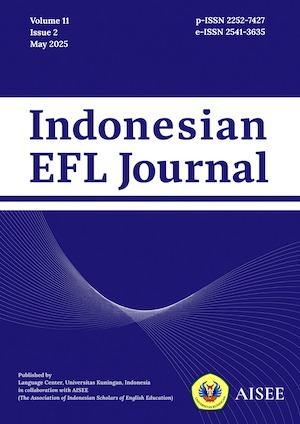ENHANCING PRONUNCIATION SKILLS IN EFL STUDENTS THROUGH THE ELSA SPEAK APPLICATION
Abstract
This study investigates the effectiveness of the ELSA Speak application in improving the pronunciation skills of EFL students. Utilizing a quasi-experimental design, the study compared the pronunciation skills of students using ELSA Speak with those using the U-Dictionary application. Data were collected through pre-tests and post-tests, and analyzed using paired sample t-tests. The researcher employed a paired sample t-test to determine if there was a statistically significant disparity between the pre-test and post-test scores of students' pronunciation abilities following the utilization of the ELSA Speak App in the experimental class and u-dictionary in the control class. The results indicate that students using ELSA Speak showed significant improvement in pronunciation skills compared to those using U-Dictionary. These findings suggest that ELSA Speak is an effective tool for enhancing pronunciation skills in EFL contexts, providing valuable insights for educators and curriculum developers.
Keywords: graphic novels; comprehension; reading; values
References
Abdullayeva Dildora Abduraxmonovna. (2020). TEACHING PRONOUNCIATION IN TEACHING ENGLISH. 1–280.
Anggraini, A. (2022). Improving Students’ Pronunciation Skill Using Elsa Speak Application. Journey: Journal of English Language and Pedagogy, 5(1), 135–141. https://doi.org/10.33503/journey.v5i1.1840
Ahmadi, M. R. (2018). technology in learning process. International Journal of Research in English Education, 3(2), 115–125.
Akhmad, N. W., & Munawir, A. (2022). Improving the Students’ Pronunciation Ability by Using Elsa Speak App. IDEAS: Journal on English Language Teaching and Learning, Linguistics and Literature, 10(1), 846–857. https://doi.org/10.24256/ideas.v10i1.2868
Aliaga García, C. (2007). The role of phonetic training in L2 speech learning. In Phonetics Teaching & Learning Conference (PTLC).
Aminatun, D. & Oktaviani, L. (2019). Memrise: Promoting Students’ Autonomous Learning Skill through Language Learning Application. Metathesis: Journal of English Language Literature and Teaching, 3(2), 214-223
A. R. Luis, 2016, “MALL and second language teaching: Challenges for initial teacher education,” Iber. Conf. Inf. Syst. Technol. Cist., vol. 2016-July, doi: 10.1109/CISTI.2016.7521623.
Cakmak, F. (2019). Mobile Learning & Mobile Assisted Language Learning (MALL) in Focus. Language and Technology.
Chien, C. W. (2019). Taiwanese EFL undergraduates’ self-regulated learning with and without technology. Innovation in Language Learning and Teaching, 13(1), 1–16. https://doi.org/10.1080/17501229.2016.1264076
Douglas Fir Group (Dwight Atkinson, Heidi Byrnes, Meredith Doran, et al.) (2016) A transdisciplinary framework for SLA in a multilingual world. Modern Language Journal 100 (Supplement 2016): 19–47.
Ellis NC (2019) Essentials of a theory of language cognition. Modern Language Journal 103 (Supplement 2019): 39–60.
E. Y. and M. A. M. M. Elaish, L. Shuib, N. Abdul Ghani, 2017, “Mobile Learning for English Language Acquisition: Taxonomy, Challenges, and Recommendations,” vol. 5, pp. 19033–19047, doi: 10.1109/ACCESS.2017.2749541.
Fadillah, A. C. (2020). PRONUNCIATION DIFFICULTIES OF EFL LEARNERS IN INDONESIA: A LITERATURE STUDY (Vol. 1, Issue 2). https://jurnalbudaya.ub.ac.id
Grimshaw, J., & Cardoso, W. (2018). Activate space rats! Fluency development in a mobile game-assisted environment. Language Learning and Technology, 22(3), 159–175.
Golshan, N., & Tafazoli, D. (2014). Technology-enhanced Language Learning Tools in Iranian EFL Context: Frequencies, Attitudes and Challenges. Procedia - Social and Behavioral Sciences, 136, 114–118. https://doi.org/10.1016/j.sbspro.2014.05.299
Gómez, C. I. H., & Pablo, M. N. (2020). Analysis of Pre-Service Foreign Language Teachers’ Incorrect Articulations: Frequency, Influence on Communication, and a Specific Corrective Strategy. Problems of Education in the 21st Century, 78(6), 933–947.
Kholis, A. (2021). Elsa Speak App: Automatic Speech Recognition (ASR) for Supplementing English Pronunciation Skills. Pedagogy: Journal of English Language Teaching, 9(1), 01. https://doi.org/10.32332/joelt.v9i1.2723
Larsen-Freeman D (2019) On language learner agency: A complex dynamic systems theory perspective. Modern Language Journal 103 (Supplement 2019): 61–79.
Luo, B. (2016). Evaluating a computer-assisted pronunciation training (CAPT) technique for efficient classroom instruction. Computer Assisted Language Learning, 29(3), 451–476. https://doi.org/10.1080/09588221.2014.963123
Moustafa Khalil, S. (2022). Effectiveness of Mobile Learning in Enhancing Saudi English Majors’ Skills in Learning Vowels. Arab World English Journal, 13(4), 281–291. https://doi.org/10.24093/awej/vol13no4.18
Ngoc, N. K., & Thanh, N. T. M. (2023). NON-SPECIALIZED STUDENTS’ BENEFITS AND CHALLENGES IN USING ELSA SPEAK APPLICATION FOR PRONUNCIATION LEARNING. European Journal of Alternative Education Studies, 8(4). https://doi.org/10.46827/ejae.v8i4.5149
Nurdyansyah, N., Rais, P., & Aini, Q. (2017). The Role of Education Technology in Mathematic of Third Grade Students in MI Ma’arif Pademonegoro Sukodono. Madrosatuna: Journal of Islamic Elementary School, 1(1), 37–46. https://doi.org/10.21070/madrosatuna.v1i1.923
Nuraeni, C., Carolina, I., Supriyatna, A., Widiati, W., & Bahri, S. (2020). Mobile-Assisted Language Learning (MALL): Students’ Perception and Problems towards Mobile Learning in English Language. Journal of Physics: Conference Series, 1641(1). https://doi.org/10.1088/1742-6596/1641/1/012027
Ramasari, M. (2017). Students Pronounciation Error Made in Speaking for General Communication. Linguistic, English Education and Art (LEEA) Journal, 1(1), 37–48. https://doi.org/10.31539/leea.v1i1.32
S. F. Isamiddinovna, 2019, “Mobile Applications As A Modern Means of Learning English,” Int. Conf. Inf. Sci. Commun. Technol. Appl. Trends Oppor. ICISCT 2019, pp. 1–5, doi: 10.1109/ICISCT47635.2019.9011897.
Sürücü, L. & M. (2020). ref suci 2.pdf.
Sholekhah, M. F., & Fakhrurriana, R. (2023). The Use of ELSA Speak as a Mobile-Assisted Language Learning (MALL) towards EFL Students’ Pronunciation. JELITA: Journal of Education, Language Innovation, and Applied Linguistics, 2(2), 93–100. https://doi.org/10.37058/jelita.v2i2.7596
Yosintha, R., & Rekha, A. (2022). “ELSA SPEAK” IN AN ONLINE PRONUNCIATION CLASS: STUDENTS’ VOICES. IJEE (Indonesian Journal of English Education), 9(1), 160–175. https://doi.org/10.15408/ijee.v9i1.23033
Zakiah, I., Elang Gumelar, R., Education, E., & Anwar Banten, ul. (n.d.). The Effect of English Language Speech Assistant (ELSA) Speak Application on Students’ Pronunciation Mastery at The Tenth Grade of SMAN 15 Pandeglang in Academic Year 2022/2023.
ناصر, I. M., & حمزة, M. H. (2023a). Pronunciation Difficulties and Challenges in the Field of Research in Jordan, 6(14), 140–157. https://doi.org/10.26389/ajsrp.e090622









